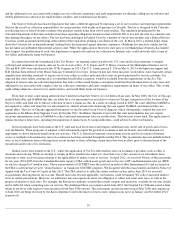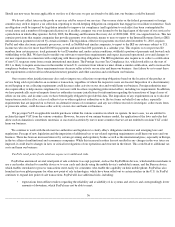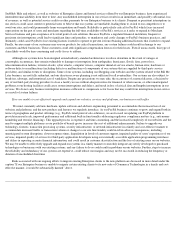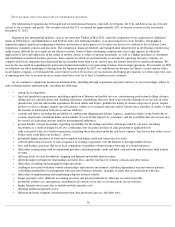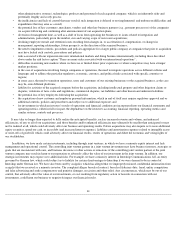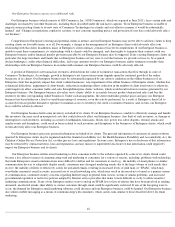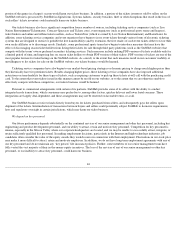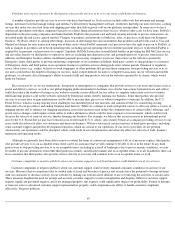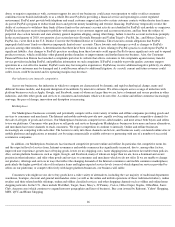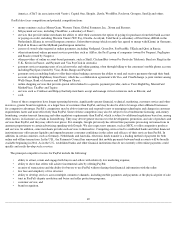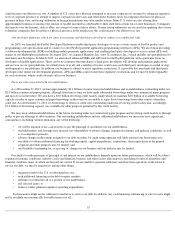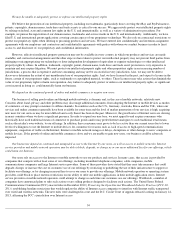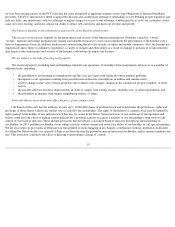eBay 2013 Annual Report Download - page 47
Download and view the complete annual report
Please find page 47 of the 2013 eBay annual report below. You can navigate through the pages in the report by either clicking on the pages listed below, or by using the keyword search tool below to find specific information within the annual report.
Problems with or price increases by third parties who provide services to us or to our users could harm our business.
A number of parties provide services to us or to our users that benefit us. Such services include seller tools that automate and manage
listings, merchant tools that manage listings and interface with inventory management software, storefronts that help our users list items, caching
services that make our sites load faster and shipping providers that deliver goods sold on our platform, among others. In some cases we have
contractual agreements with these companies that give us a direct financial interest in their success, while in other cases we have none. PayPal is
dependent on the processing companies and banks that link PayPal to the payment card and bank clearing networks to process transactions. As
described under the risk factor caption entitled “Changes to payment card networks or bank fees, rules, or practices could harm our Payments
business,” PayPal is subject to, among other things, increases in interchange fees and assessments that payment card networks such as Visa and
MasterCard charge for each transaction using one of their cards (which PayPal's payment card processors have the right to pass on to PayPal), as
well as changes in payment card network operating rules, including special operating rules for Internet payment services (with which PayPal is
required by its payment card processors to comply). Similarly, Bill Me Later relies on unaffiliated lenders in providing the Bill Me Later service
and also relies heavily on third parties to operate its services, including merchant processors and payment gateways to process transactions. In
addition, our Enterprise business utilizes unaffiliated payment processing companies to process transactions on the websites operated by
Enterprise clients, third parties to provide underlying components of its ecommerce platform, third party carriers to ship packages to customers
of Enterprise clients and third parties in its operations business to perform services during peak order volume periods. Financial or regulatory
issues, labor issues (e.g., strikes, lockouts or work stoppages) or other problems that prevent these companies from providing services to us or
our users could reduce the number of listings on our sites, make it more difficult for users to complete transactions on our websites and mobile
platforms, or adversely affect Enterprise's ability to timely fulfill and ship products sold on the websites operated by its clients, which would
harm our business.
Price increases by, or service terminations, disruptions or interruptions at, companies that provide services to our users and clients (such as
postal and delivery services, as well as our global shipping platform intended to facilitate cross-border transactions between buyers and sellers)
could also reduce the number of listings on our websites or make it more difficult for our sellers to complete transactions or for us to timely
fulfill and ship products sold on the websites operated by Enterprise clients, thereby harming our business. Some third parties who provide
services to us may have or gain market power and be able to increase their prices to us without competitive constraint. In addition, the U.S.
Postal Service, which is facing ongoing fiscal challenges, has instituted postal rate increases and announced that it is considering closing
thousands of local post offices and ending Saturday mail delivery. While we continue to work with global carriers to offer our sellers a variety of
shipping options and to enhance our shipping experience, postal rate increases may reduce the competitiveness of certain sellers' offerings, and
postal service changes could require certain sellers to utilize alternatives which could be more expensive or inconvenient, which could in turn
decrease the velocity of trade on our site, thereby harming our business. For example, we believe that recent increases in international postal
rates by the U.S. Postal Service may have reduced cross-
border trade by U.S. sellers. Any security breach at a company providing services to our
users could also adversely affect our customers and harm our business. We have outsourced certain functions to third-party providers, including
some customer support and product development functions, which are critical to our operations. If our service providers do not perform
satisfactorily, our operations could be disrupted, which could result in user dissatisfaction and adversely affect our velocity of trade, business,
reputation and operating results.
Although we generally have been able to renew or extend the terms of contractual arrangements with, or if necessary replace, third parties
who provide services to us on acceptable terms, there can be no assurance that we will continue to be able to do so in the future. If any third
parties were to stop providing services to us on acceptable terms, including as a result of bankruptcy due to poor economic conditions, we may
be unable to procure alternatives from other third parties in a timely and efficient manner and on acceptable terms, or at all. In addition, there can
be no assurance that third parties who provide services directly to our users will continue to do so on acceptable terms, or at all.
Customer complaints or negative publicity about our customer support or anti-fraud measures could diminish use of our services.
Customer complaints or negative publicity about our customer support could severely diminish consumer confidence in and use of our
services. Measures that we sometimes take to combat risks of fraud and breaches of privacy and security have the potential to damage relations
with our customers or decrease activity on our websites by making our websites more difficult to use or restricting the activities of certain users.
These measures heighten the need for prompt and accurate customer support to resolve irregularities and disputes. Effective customer support
requires significant personnel expense, and if not managed properly, this expense could significantly impact our profitability. Failure to manage
or train our own or outsourced customer support representatives properly could compromise our ability to handle customer complaints
effectively. Negative publicity
45


